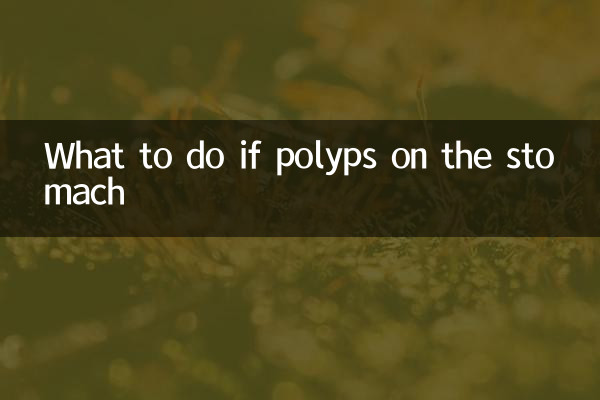What to do if polyps grow on the stomach?
In recent years, with the improvement of health awareness and the advancement of medical technology, gastric polyps problems have gradually become the focus of public attention. Many people will inevitably feel worried when they find polyps on their stomach during physical examinations or gastroscopy. This article will combine popular topics and hot contents across the network for the past 10 days to answer detailed questions about polyps on the stomach and provide scientific response suggestions.
1. What is gastric polyps?

Gastric polyps refer to benign lesions protruding on the surface of the gastric mucosa, which are usually divided into inflammatory polyps, adenomatous polyps and proliferative polyps. Most gastric polyps do not have obvious symptoms, usually found by chance during gastroscopy.
| Polyp type | Features | Risk of malignancy |
|---|---|---|
| Inflammatory polyps | Related to chronic gastritis, smaller size | Extremely low |
| Adenomatous polyps | There is potential malignancy | Higher |
| Hyperplasia polyps | Commonly found in the antrum of the stomach, mostly related to Helicobacter pylori infection | Lower |
2. Causes of polyps on the stomach
The formation of gastric polyps is related to a variety of factors, and the following are several common reasons:
| Cause category | Specific factors |
|---|---|
| Infection factors | Helicobacter pylori infection |
| Dietary factors | High-salt diet, pickled food, smoking, drinking |
| Genetic factors | Familial adenomatous polyposis |
| Other factors | Long-term use of proton pump inhibitors, gastric acid reflux, etc. |
3. Common symptoms of gastric polyps
Most patients with gastric polyps do not have obvious symptoms, but when the polyps are larger or larger, the following symptoms may occur:
1. Upper abdominal discomfort or hidden pain
2. Nausea, vomiting
3. Indigestion
4. Black stool (when polyps are bleeding)
5. Anemia (long-term chronic bleeding)
4. What should I do if I have polyps on my stomach?
There is no need to panic excessively after discovering gastric polyps, but you should not take it lightly. The following are scientific suggestions:
1. Clarify the diagnosis
Gastroscopy to identify the size, number, location and morphological characteristics of the polyp, and perform biopsy when necessary to determine the pathological type.
2. Treatment plan selection
| Polyps | How to deal with it |
|---|---|
| Inflammatory or hyperplastic polyps with a diameter of less than 0.5 cm | Regular follow-up observation |
| Polyps with a diameter of >0.5cm | Endoscopic resection |
| Adenomatous polyps | It is recommended to remove it as soon as possible |
| Multiple polyps or special types | Surgical treatment may be required |
3. Postoperative follow-up
After polyps are removed, gastroscopy should be checked regularly according to the doctor's advice to monitor for recurrence or new polyps.
4. Lifestyle adjustment
• Quit smoking and limit alcohol
• Diet lightly and avoid pickled and smoked foods
• Regular work and rest to avoid overwork
• Maintain a good attitude
5. How to prevent gastric polyps?
1. Regular physical examinations, especially those with a family history of gastric cancer
2. Actively treat Helicobacter pylori infection
3. Avoid long-term use of proton pump inhibitors
4. Maintain healthy eating habits
5. Control symptoms of gastroesophageal reflux
6. FAQs
Q: Will gastric polyps turn into gastric cancer?
A: Most gastric polyps will not undergo malignant changes, but adenomatous polyps may undergo malignant changes and should be dealt with in a timely manner.
Q: Will the gastric polyps grow again after removal?
A: It is possible, especially when the pathogenic factors are not removed, so postoperative follow-up is important.
Q: Is gastric polyps surgery painful?
A: Currently, painless gastroscopy is mostly used, and the patients are basically suffering free.
Conclusion:
Although polyps on the stomach are common, most of them are benign. The key is to clarify the nature through professional inspections and take appropriate measures. It is recommended to seek medical treatment in time after gastric polyps are discovered, and a professional doctor will evaluate it and formulate a personalized treatment plan. At the same time, maintaining good living habits and regular physical examinations can effectively prevent the occurrence and recurrence of gastric polyps.

check the details

check the details